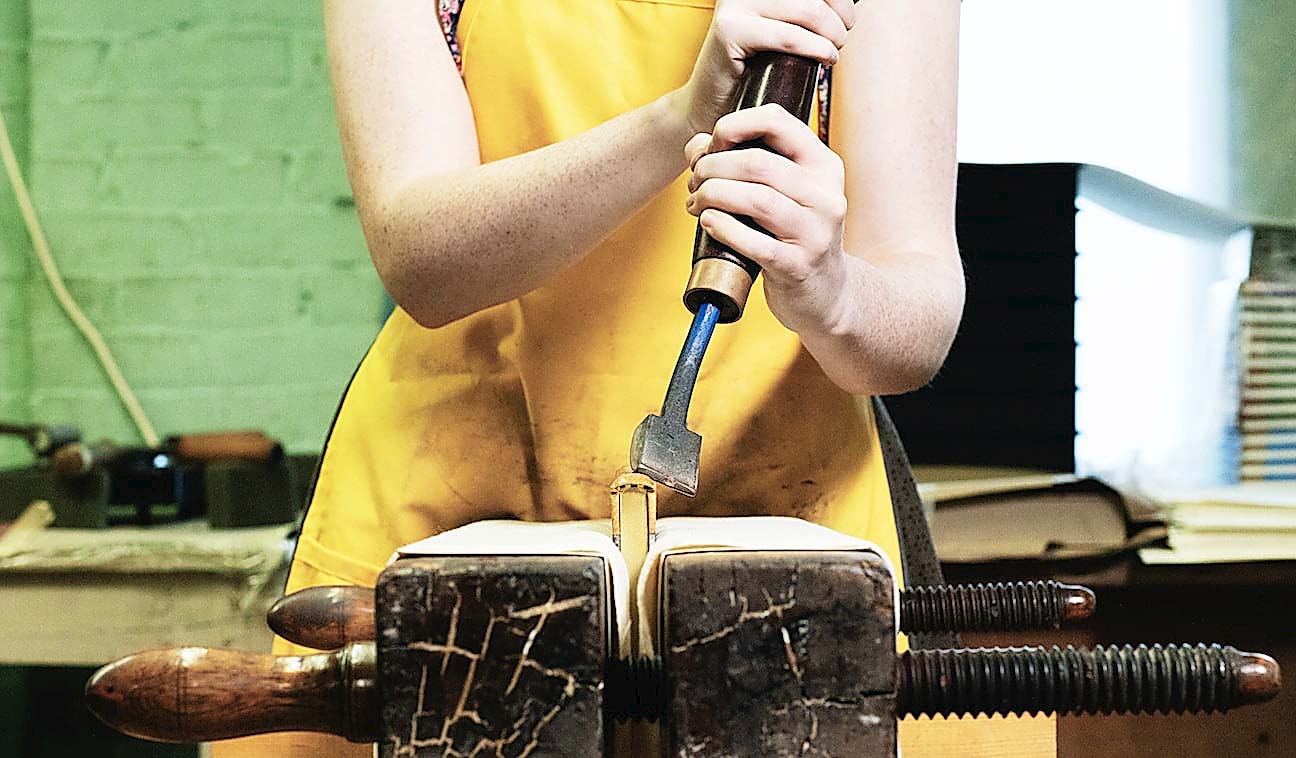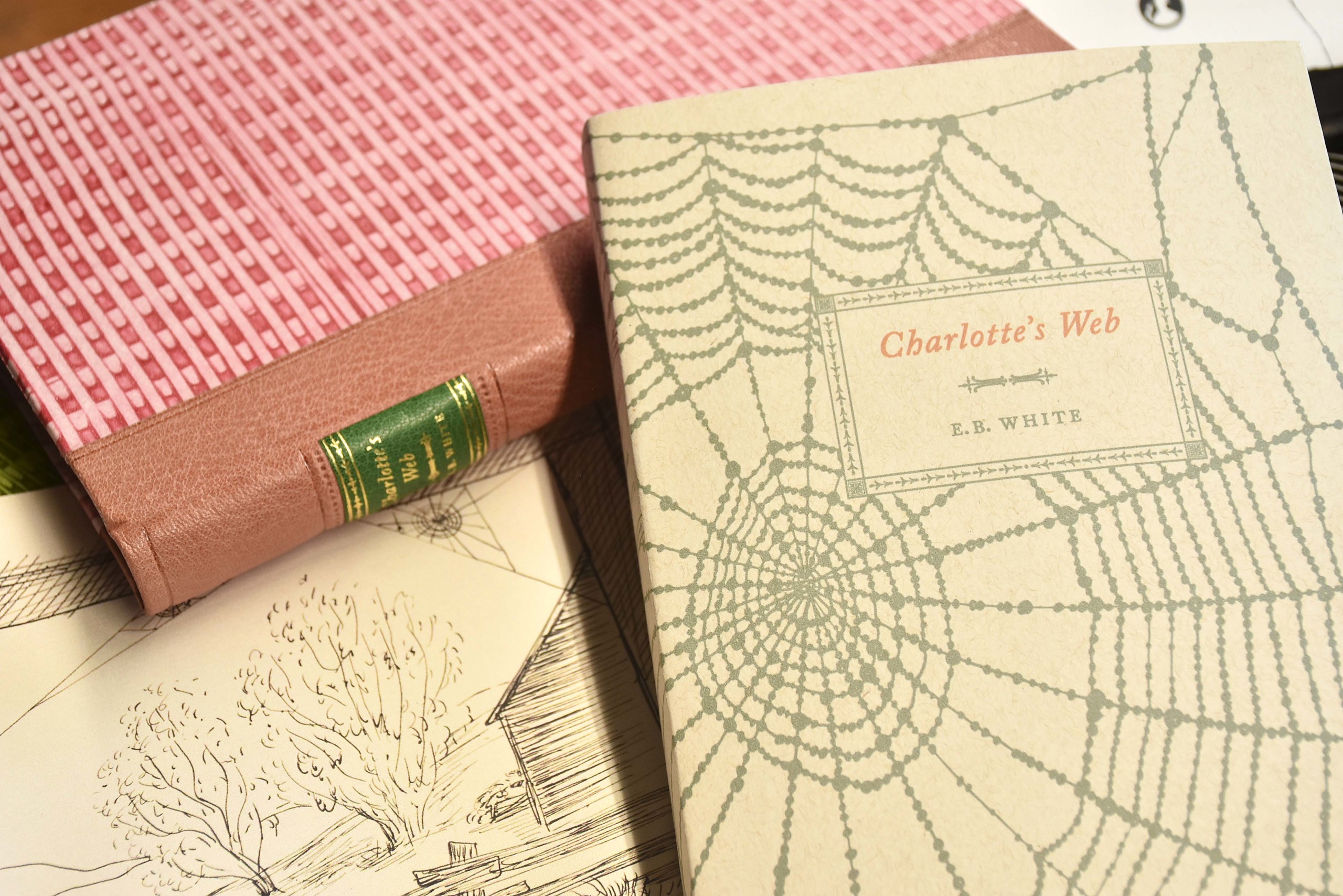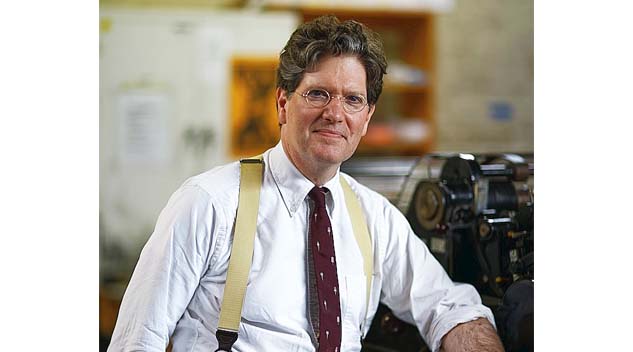#Luke #Ives #Pontifell #Antiques #Arts #Weekly

Luke Ives Pontifell is the founder of Thornwillow Press, a small publishing house in Upstate New York that has produced more than 100 unique editions since 1985. Thornwillow is devoted to preserving the craft of bookbinding, stationery and more, from making the paper to its gilt finishing. In addition to Thornwillow’s publications, Pontifell has expanded the business to support and mentor a new generation of fine craftspeople who will carry on these traditions. As technology steadily pervades every corner of our lives, Thornwillow is a homegrown business with a mission to provide lasting and powerful examples of the written word. We corresponded with Pontifell via email to learn more.
Please tell us about yourself and your background.
My name is Luke Pontifell, and I am a printer and publisher of handmade limited edition books. I started Thornwillow Press when I was 16 and still in high school. What started as a hobby almost 40 years ago has grown into my life’s work. Today, Thornwillow consolidates the related Arts and Crafts of the written word in one place, a complex of Nineteenth Century brick factory buildings in the historic city of Newburgh, N.Y. Here, together with my wife Savine, who is my partner in running the press, we are committed not just to making beautiful books but also to teaching and perpetuating the related Arts and Crafts of the written word.
What inspired you to open Thornwillow Press?
I was born in New York City and grew up there, and in Western Massachusetts. My father was a writer and creative director at an advertising agency. He was passionate about the theater and had an extensive reading library. He wasn’t a book collector per se, but our home was full of books. My mother is a sculptor and from my earliest memories I watched her make things out of wood, wool, ceramics and all kinds of found objects. When I was little, we would make toys. So, from my earliest memories, craft was an integral part of life. It’s just what one did.
Together my parents restored an Eighteenth Century farmhouse in West Stockbridge, Mass. It is really like a museum. Many would find it uncomfortable and not set up for “the way we live now.” It is furnished with Eighteenth and early Nineteenth Century furniture. Growing up with antiques and living with things and in a place that is rooted in history, certainly influenced my interest in becoming a maker of books, books that will be here long after we are gone and will be, in their way, caretakers of the ideas in them for readers for years to come.
I started Thornwillow after taking a course in letterpress printing when I was 16 at the Center For Book Arts in New York. You can take the same course today. A family friend, the historian and World War II correspondent William L. Shirer, joked that I should print something of his and the next thing I realized he handed me an envelope with a manuscript recounting how the world changed in an instant after the dropping of the atomic bomb. It was the 40th anniversary of the bombings of Hiroshima and Nagasaki and he thought this monograph would be timely.
Every year during college I made one book. I concentrated in history and literature at Harvard College and spent much of my time at Houghton Library, the rare book library. I studied with Roger Stoddard, Rodney Dennis, Eleanor Garvey and Richard Wendorf, all of whom introduced me to books, ancient and new. In every way, the books I make today are rooted in being able to engage with the historic volumes in the Houghton collection.

Polishing a leather spine in the Thornwillow bindery.
Did you set out to become a publisher, or did it happen naturally?
The way things evolved was organic. I wrote letters to authors who I hoped might work with me, and sometimes they said yes. Each time I would send a copy of a previous work to show what I had in mind and asked if they might let me do the same for a work of theirs. One thing led to another and before I knew it, I had printed and published books by Arthur Schlesinger, Walter Cronkite, Helmut Kohl and John Updike.
The Thornwillow story has many chapters. The first, when I was in school and just starting out. The next 14 years involved traveling the world to work with extraordinary craftspeople; eventually setting up a paper mill in the Czech Republic, a book binding operation in England and an engraving company in Florida. Each of these small artisanal operations were geared around working with the most amazing people possible. But for all that this period was inspiring and resulted in some books that we are immensely proud of, it proved increasingly impossible to run an artisanal enterprise as a multinational corporation. Also, as fate would have it, everything one is warned about doing business in Eastern Europe turned out to be true for us. The good news is that these challenges ended up being a catalyst to consolidate the operations together in one place and realizing our dream of uniting the related crafts of bookmaking in one place has become a reality.
My wife found the new home for Thornwillow in Newburgh by placing a compass on the map and drawing a one hour radius around our apartment in New York City. Over the last 18 years, we have assembled an enormous collection of historic equipment and created a campus of historic buildings around the press that we call the Thornwillow Makers Village. Together with the Thornwillow Institute, a 501(c)(3) public charity, we are committed to catalyzing an Arts and Crafts Movement around book arts that as much as the objects that we make is about revitalizing our community. In subscribing to a Thornwillow book, one doesn’t just add a beautiful book to your shelf, you support artisans dedicated to their craft and to perpetuating it. You also join a community which believes that well-designed objects are made by real people and crafted to last matter.

Thornwillow Maker’s Village, architect’s rendering of the Corner Bookstore.
What are the main challenges of being a small print publisher in an increasingly digital market?
When we first set out to bring all the operations together in Newburgh, friends warned that it would be impossible to do this work in America because we would not be able to find the skilled craftspeople. To a certain extent that has been true and was one of the main reasons that we set up the Thornwillow Institute to teach the necessary crafts, not just for our projects but to help ensure that the crafts survive. Mastering a craft doesn’t come quickly, it takes years to become good at your work. What is important to remember is that the journey is the destination. Where we are today is not where we will be tomorrow and when tomorrow comes, we will not be done. I think every artist and craftsperson regardless of their discipline knows this.
In this age of disposable and intangible communications, of virtual relationships and AI, something made by real people who have dedicated themselves to the pursuit of excellence and craft matters more than ever before. Whenever people are confronted with dehumanizing forces, there is a counter force to celebrate and appreciate what is human. It is the foundation for a modern day Arts and Crafts Movement that is essential to our identity. Craft is at the root of what makes us human. It gives livelihood, spirituality and purpose. Swimming against the current is both a challenge and an inspiring opportunity.
Is there a printing or title of which you are particularly proud?
My hope is when you look at a wall of Thornwillow books that together they are more than the sum of their parts. Over the years we have published history, new and classic fiction and poetry, facsimiles and new original artwork. One project that we have been immersed in over the last two years is our Centennial Edition of James Joyce’s Ulysses. This has been one of the most ambitious projects we have ever undertaken, and I am extremely proud of this monumental project. The next title that we have just started working on in the press room is the first ever fine press edition of Charlotte’s Web. Now, more than ever, I believe that children should be taught to appreciate and experience beautiful objects. It is essential that not everything in our children’s lives be digital.
I am also particularly proud of the Thornwillow Dispatch, our monthly subscription box of fine printing. Every month subscribers receive a short publication along with a curated assortment of finely printed ephemera like broadsides, bookmarks and note cards). Some months are classic texts that we think are relevant today, and others are works by established current authors. A few times a year, we feature the work of a new emerging writer through the Thornwillow Patrons’ Prize, which we have been awarding in collaboration with NYFA for the last four years. The Dispatch is a gateway into the world of Thornwillow.

The upcoming Thornwillow Press edition of E.B. White’s Charlotte’s Web.
Any concluding thoughts?
The Thornwillow motto, which has been with the press almost since the beginning, remains at the root of our mission: Ars omnia tuetur. Art teaches and protects all.
[For information, www.thornwillow.com.]
—Z.G. Burnett




